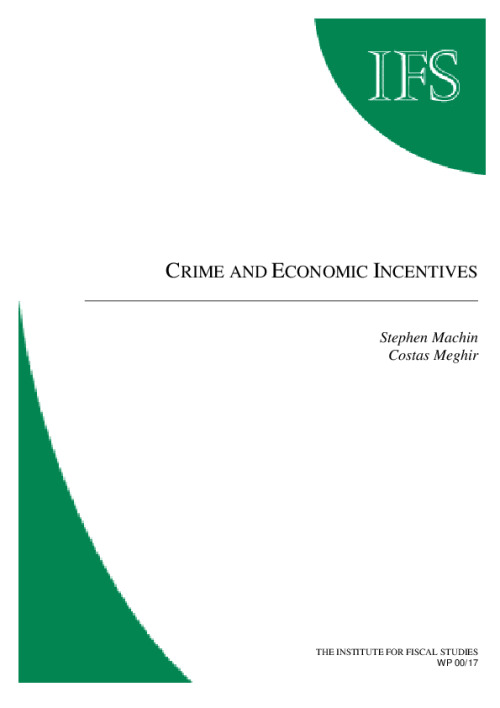Downloads

wp0017.pdf
PDF | 140.1 KB
We explore the role that economic incentives, particularly changes in wages at the bottom end of the wage distribution, play in determining crime rates. We use data on the police force areas of England and Wales between 1975 and 1996. We find that falls in the wages of unskilled workers leads to increases in crime. We carry out a number of experiments with different wage measures, including a wage measure that accounts for the effects of changes in the composition of employment. These reinforce the picture of a strong impact of wages on crime. The result that incentives play a central role is reinforced further by the strong impact on crime of deterrence measures and of a measure of the returns to crime.
Authors

Research Fellow Yale University
Costas is a Research Fellow of the IFS and a Professor of Economics at Yale University and a Visiting Professor at University College London.

Stephen Machin
Working Paper details
- DOI
- 10.1920/wp.ifs.2000.0017
- Publisher
- IFS
Suggested citation
Machin, S and Meghir, C. (2000). Crime and economic incentives. London: IFS. Available at: https://ifs.org.uk/publications/crime-and-economic-incentives (accessed: 30 June 2024).
More from IFS
Understand this issue

If you can’t see it, you can’t be it: role models influence female junior doctors’ choice of medical specialty
24 April 2024

Sure Start achieved its aims, then we threw it away
15 April 2024

The NHS waiting list: when will it come down?
29 February 2024
Policy analysis

How do the last five years measure up on levelling up?
19 June 2024

The Conservatives and the Economy, 2010–24
3 June 2024

A decade and a half of historically poor growth has taken its toll
3 June 2024
Academic research

The impact of labour demand shocks when occupational labour supplies are heterogeneous
28 June 2024

Labour market inequality and the changing life cycle profile of male and female wages
15 April 2024

Interpreting cohort profiles of lifecycle earnings volatility
15 April 2024